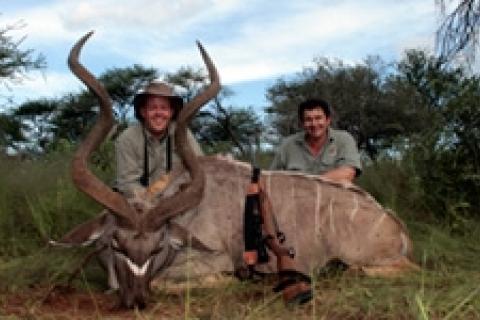
I 've been fortunate enough to spend a considerable amount of time over the years with hunting guides in a number of states and provinces, and also Africa. This has allowed me to gain a bit of insight into to how to maximize the enjoyment of the time you spend together, and maybe also the amount of success you have. In Part I, I offered a few tips. Here are five more:
've been fortunate enough to spend a considerable amount of time over the years with hunting guides in a number of states and provinces, and also Africa. This has allowed me to gain a bit of insight into to how to maximize the enjoyment of the time you spend together, and maybe also the amount of success you have. In Part I, I offered a few tips. Here are five more:
- Trust your guide. I still laugh about a Wyoming pronghorn hunt I experienced a number of years back. Literally the first pronghorn I ever laid eyes on, just a few hours after my plane landed, was a whopper of buck that my guide spotted as we drove just outside of town. I didn't want my hunt to end so soon (officially it didn't start until the next day), and this was just the first antelope we encountered, so I suggested that we continue on and look for more. After a few minutes of trying to convince my guide to press on, he practically had to twist my arm to take the pronghorn. I'm glad I listened; he was a real stud that almost made the record books. The point is, your guide knows better than anyone the quality of animal your hunting area produces, and he's also likely a far better judge of trophy quality. When he tells you to shoot...shoot.
- Be ready and able to shoot. Few things are more irksome to a guide than a client who takes so long to take the shot that the animal moves away, or can't shoot straight when the trigger is finally pulled. Become familiar with your bow or rifle before your hunt, practice shooting at both short and long ranges and from various positions, and practice getting on target quickly. If you will be using shooting sticks of some sort, such as in Africa, practice with those well before your hunt.
- Keep a positive attitude, even when things are tough. As my B.C. bear guide Dave Vey reminded me, "When things aren't going well for you, they are going even worse for your guide. A good guide puts enough pressure on himself to produce without clients getting upset about things beyond our control." No one can do anything about the weather, game movement or lack thereof, and a host of other things that make it "hunting". But remaining patient and keeping the right attitude can certainly go a long way toward an enjoyable hunt, regardless of what's hanging on the meat pole.
- Offer to help out. There are usually a lot of chores around a hunt camp that need to be done, and the guides always have their hands full. Especially on horseback hunts, a guide is often up and hard at work for an hour or two before the client is even awake. Any assistance you can lend with things like chopping wood, washing dishes, etc. will be greatly appreciated, and that little bit of help may ease your guide's workload just enough that he may have a bit more time and energy to allow the two of you to go a little further and hunt a little longer.
- Tip well. This can be a contentious topic, but remember that guides often get paid a very low wage for very long hours of hard work, and they rely on tips to make a living. In fact, in some areas a guide's compensation is 100 percent tips. But don't tell your guide at the start of the hunt, "If you get me a real whopper, there's a big tip in it for you". They've heard that many times before, and all too often the tip doesn't live up to its billing. Besides, they are trying their best to get a "whopper" for each client. A generous tip at the end of a hunt, even one that wasn't ultimately successful, shows that you appreciated the guide's efforts and hard work, and he won't forget that the next time you come back. Somewhere in the neighborhood of 10 percent of the hunt price is pretty much standard in many places for most hunts, but the outfitter or other hunters who may have hunted there before can provide advice as well. Certainly if your hunt was very successful or perhaps you are bringing home a world class trophy and not just a good representative specimen, your tip should reflect that. And remember, cash is king. If your guide happened to take a shine to your rangefinder, binoculars, hunting knife, etc., by all means feel free to leave it behind as a gift, but it won't put food on his family's table so a gift of this nature should supplement not replace a cash gratuity.
Good hunting.
- 2887 views

